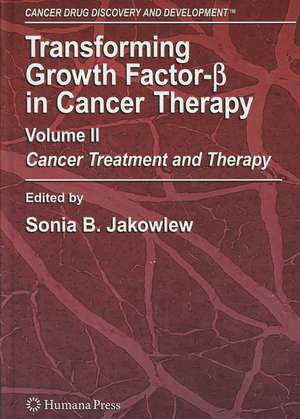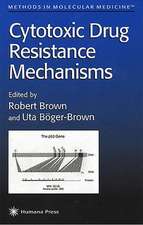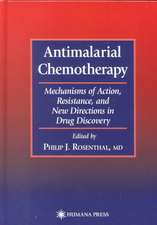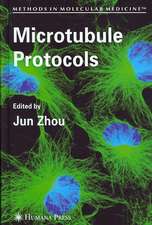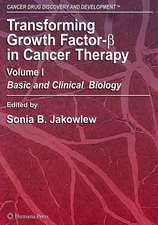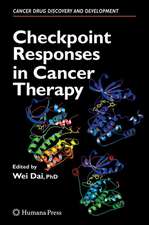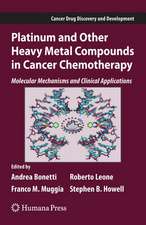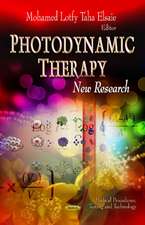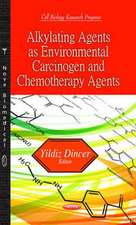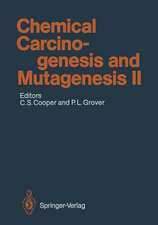Transforming Growth Factor-Beta in Cancer Therapy, Volume II: Cancer Treatment and Therapy: Cancer Drug Discovery and Development
Editat de Sonia B. Jakowlew Cuvânt înainte de C.-H. Heldinen Limba Engleză Hardback – 28 feb 2008
| Toate formatele și edițiile | Preț | Express |
|---|---|---|
| Paperback (1) | 1827.16 lei 6-8 săpt. | |
| Humana Press Inc. – 19 noi 2010 | 1827.16 lei 6-8 săpt. | |
| Hardback (1) | 1365.85 lei 38-44 zile | |
| Humana Press Inc. – 28 feb 2008 | 1365.85 lei 38-44 zile |
Din seria Cancer Drug Discovery and Development
- 5%
 Preț: 1474.98 lei
Preț: 1474.98 lei - 5%
 Preț: 1108.35 lei
Preț: 1108.35 lei - 5%
 Preț: 1415.75 lei
Preț: 1415.75 lei - 5%
 Preț: 1370.22 lei
Preț: 1370.22 lei - 5%
 Preț: 1452.28 lei
Preț: 1452.28 lei - 5%
 Preț: 1316.76 lei
Preț: 1316.76 lei - 5%
 Preț: 1439.50 lei
Preț: 1439.50 lei - 5%
 Preț: 1113.63 lei
Preț: 1113.63 lei - 5%
 Preț: 1126.24 lei
Preț: 1126.24 lei - 24%
 Preț: 1037.62 lei
Preț: 1037.62 lei - 5%
 Preț: 1466.37 lei
Preț: 1466.37 lei - 5%
 Preț: 1350.83 lei
Preț: 1350.83 lei - 5%
 Preț: 1417.54 lei
Preț: 1417.54 lei - 5%
 Preț: 1113.46 lei
Preț: 1113.46 lei - 5%
 Preț: 1428.54 lei
Preț: 1428.54 lei - 5%
 Preț: 1429.80 lei
Preț: 1429.80 lei - 5%
 Preț: 782.10 lei
Preț: 782.10 lei - 5%
 Preț: 1438.58 lei
Preț: 1438.58 lei - 5%
 Preț: 1110.32 lei
Preț: 1110.32 lei - 5%
 Preț: 1434.39 lei
Preț: 1434.39 lei - 5%
 Preț: 1461.08 lei
Preț: 1461.08 lei - 5%
 Preț: 1106.86 lei
Preț: 1106.86 lei - 5%
 Preț: 982.20 lei
Preț: 982.20 lei - 5%
 Preț: 727.80 lei
Preț: 727.80 lei - 5%
 Preț: 1331.78 lei
Preț: 1331.78 lei - 5%
 Preț: 1297.43 lei
Preț: 1297.43 lei - 5%
 Preț: 1124.59 lei
Preț: 1124.59 lei - 5%
 Preț: 1433.10 lei
Preț: 1433.10 lei - 5%
 Preț: 1110.90 lei
Preț: 1110.90 lei - 5%
 Preț: 1317.79 lei
Preț: 1317.79 lei - 5%
 Preț: 1464.91 lei
Preț: 1464.91 lei - 5%
 Preț: 1939.63 lei
Preț: 1939.63 lei - 5%
 Preț: 1418.48 lei
Preț: 1418.48 lei - 5%
 Preț: 1438.94 lei
Preț: 1438.94 lei - 5%
 Preț: 1100.30 lei
Preț: 1100.30 lei - 5%
 Preț: 1109.96 lei
Preț: 1109.96 lei - 5%
 Preț: 990.60 lei
Preț: 990.60 lei - 5%
 Preț: 1443.13 lei
Preț: 1443.13 lei - 5%
 Preț: 1428.91 lei
Preț: 1428.91 lei - 5%
 Preț: 787.58 lei
Preț: 787.58 lei - 5%
 Preț: 1311.75 lei
Preț: 1311.75 lei - 5%
 Preț: 1331.78 lei
Preț: 1331.78 lei - 5%
 Preț: 1113.11 lei
Preț: 1113.11 lei - 5%
 Preț: 1440.76 lei
Preț: 1440.76 lei
Preț: 1365.85 lei
Preț vechi: 1437.73 lei
-5% Nou
Puncte Express: 2049
Preț estimativ în valută:
261.39€ • 271.89$ • 215.79£
261.39€ • 271.89$ • 215.79£
Carte tipărită la comandă
Livrare economică 11-17 aprilie
Preluare comenzi: 021 569.72.76
Specificații
ISBN-13: 9781588297150
ISBN-10: 1588297152
Pagini: 776
Ilustrații: XXVI, 786 p. 164 illus., 4 illus. in color.
Dimensiuni: 178 x 254 x 36 mm
Greutate: 1.81 kg
Ediția:2008
Editura: Humana Press Inc.
Colecția Humana
Seria Cancer Drug Discovery and Development
Locul publicării:Totowa, NJ, United States
ISBN-10: 1588297152
Pagini: 776
Ilustrații: XXVI, 786 p. 164 illus., 4 illus. in color.
Dimensiuni: 178 x 254 x 36 mm
Greutate: 1.81 kg
Ediția:2008
Editura: Humana Press Inc.
Colecția Humana
Seria Cancer Drug Discovery and Development
Locul publicării:Totowa, NJ, United States
Public țintă
ResearchCuprins
Transforming Growth Factor-? In Developing and Advanced Cancers.- Transforming Growth Factor-? Signaling in Pancreas Development and Pancreatic Disease.- Role of Transforming Growth Factor-? in the Pathogenesis of Human Head and Neck Squamous Cell Carcinoma.- TGF-?, Smads and Cervical Cancer.- TGF-? Signaling and Biglycan in Pancreatic Cancer.- TGF-? Signaling in Endometrial Cancer.- TGF-? Ligands, TGF-? Receptors, and Lung Cancer.- Role of TGF-? in Osteolytic Bone Metastases.- Hormonal Regulation of Transforming Growth Factor-? in Breast Cancer.- TGF-? and Progression of Esophageal Cancer.- TGF-? and HER2/ErbB2 and Breast Cancer Progression.- TGF-? Dependent T-Cell Regulation in Colitis and Colon Cancer.- Role of Transforming Growth Factor-? in the Kidney — Physiology and Pathology.- Perturbations of TGF-? Signaling in Leukocytes as Drivers of Leukemogenesis and Epithelial Tumorigenesis.- Transforming Growth Factor-? in Brain Functions and Dysfunctions.- Inhibition of TGF-? Signaling in Multiple Myeloma and Its Bone Marrow Microenvironment.- Key Roles of TGF-? and Smad3 in Prostate Cancer.- Smad Signaling in Leukemic Growth and Differentiation: Crosstalk Between Smad and Multiple Pathways Through Activation of the TGF-? Type I Receptor.- Transforming Growth Factor-? in Cancer Treatment and Therapy.- High-Throughput Screening of Protein Interaction Networks in the TGF? Interactome: Understanding the Signaling Mechanisms Driving Tumor Progression.- Tumor Suppressor and Pro-progression Roles for TGF-? in Breast Cancer.- Tumor Suppressors p53 and TGF? Converge to Regulate the Alpha-Fetoprotein Oncodevelopmental Tumor Marker.- TGF?: Roles in DNA Damage Responses.- The Rationale for and Effects of Targeting TGF-? for Glioma Therapy.- TumorSuppressor Functions of TGF?1 in T Cells.- Therapeutic Effects of Adenovirus-Mediated Gene Transfer of TGF-? Signal Antagonists on Undesirable Epithelial-Mesenchymal Transition and Neovascularization.- Role of TGF-? in Tumor Protection and Antitumor Immunity.- Regulation of Angiogenesis and Tumor Growth by Thrombospondin-1.- Cancer-Associated Fibroblasts and the Role of TGF-?.- Adoptive Transfer of Tumor Reactive TGF-? Insensitive CD8+ T-cells for Cancer Therapy.- DNA Methylation and Histone Deacetylation Inhibitors as Potential Therapeutic Agents for the Reconstitution of TGF-? Signaling in Breast Cancer.- Reactive Stroma and Evolution of Tumors: Integration of Transforming Growth Factor-?, Connective Tissue Growth Factor, and Fibroblast Growth Factor-2 Activities.- TGF-? Signaling and Vascular Morphogenesis.- Aberrant Transforming Growth Factor-? Signaling in Human Pancreatic Cancer: Translational Implications.- TGF-? and Stromal Influences Over Local Tumor Invasion.- TGF-? at the Crossroads Between Inflammation, Suppression and Cancer.- Development of Inhibitors of Transforming Growth Factor-? Signaling for Therapy.- Transforming Growth Factor-? (TGF-?) Signaling Inhibitors in Cancer Therapy.- Targeting TGF-? as a Strategy to Ameliorate Intestinal Side Effects of Radiation Therapy.- Targeting Transforming Growth Factor-? in Metastasis: In Vitro and In Vivo Mechanisms.- Targeted Downregulation of TGF-?2 with AP 12009 in Tumor Therapy.- Modulating TGF-? Receptor Signaling: A Novel Approach of Cancer Therapy.- Engineering TGF-? Traps: Artificially Dimerized Receptor Ectodomains as High-affinity Blockers of TGF-? Action.- The Use of Virtual Screening in ALK5 Kinase Inhibitor Discovery and Validation of Orally Active ALK5 Kinase Inhibitors inOncology.- Soluble Type II Transforming Growth Factor-? Receptor Inhibits Tumorigenesis by Augmenting Host Antitumor Immunity.- Reversal of EMT by Small-Molecule Inhibitors of TGF-? Type I and II Receptors: Implications for Carcinoma Treatment.- Soluble TGF-? Type III Receptor Suppresses Malignant Progression of Human Cancer Cells.- Targeting Smad-Dependent TGF-? Signaling with Peptide Aptamers.- Rationale for Anti-TGF-? Antibody Therapy in Oncology.
Recenzii
From the reviews:
"This volume … provide readers with a detailed account of the role of TGF-beta in the development of various cancers in numerous organs. … This will likely be of interest to those in the field as well as those who are new … . will be of interest to researchers at all levels. The book will likely attract new researchers and students interested in becoming engaged in new frontiers of cancer therapy. … This will be a great resource for researchers and clinicians … ." (James P Luyendyk, Doody’s Review Service, June, 2008)
"This volume … provide readers with a detailed account of the role of TGF-beta in the development of various cancers in numerous organs. … This will likely be of interest to those in the field as well as those who are new … . will be of interest to researchers at all levels. The book will likely attract new researchers and students interested in becoming engaged in new frontiers of cancer therapy. … This will be a great resource for researchers and clinicians … ." (James P Luyendyk, Doody’s Review Service, June, 2008)
Textul de pe ultima copertă
Transforming Growth Factor-ß in Cancer Therapy, Volumes 1 and 2, provides a compendium of findings about the role of transforming growth factor-ß (TGF-ß) in cancer treatment and therapy. The second volume, Cancer Treatment and Therapy, is divided into three parts. Part I examines transforming growth factor-ß in developing and advanced cancers. Part II details transforming growth factor-ß in cancer treatment and therapy. Part III includes an investigation into the development of inhibitors of transforming growth factor-ß signaling for therapy.
This volume’s companion, Basic and Clinical Biology, examines transforming growth factor-ß signaling in normal physiology, cancer pathobiology, normal and tumor biology, and inflammation and fibrosis. Together, Transforming Growth Factor-ß in Cancer Therapy, Volumes 1 and 2, provide researchers and clinicians with a comprehensive and cutting-edge reference for the findings about the role of transforming growth factor-ß in biology and cancer treatment.
This volume’s companion, Basic and Clinical Biology, examines transforming growth factor-ß signaling in normal physiology, cancer pathobiology, normal and tumor biology, and inflammation and fibrosis. Together, Transforming Growth Factor-ß in Cancer Therapy, Volumes 1 and 2, provide researchers and clinicians with a comprehensive and cutting-edge reference for the findings about the role of transforming growth factor-ß in biology and cancer treatment.
Caracteristici
Details the role of TGF- ß in cancer treatment and therapy, including its role in development and progression of several different cancers Conveniently divided into three easy-to-follow parts Companion volume details the role of TGF- ß on basic and clinical biology
